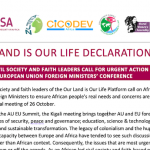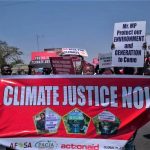In the wake of the climate emergency, countries on the African continent face severe effects even when it is common knowledge that they are the least contributors to global carbon emissions. The 26th Conference of the Parties to the UN Framework Convention on Climate Change (COP26) will take place in Glasgow, United Kingdom. COP26 aims to commit States to more ambitious 2030 emissions reduction targets. In preparation for this COP, we recognize that more than 20 African countries have already revised or updated their Nationally Determined Contributions (NDCs).
This statement was generated during the 2021 Africa Climate Week in a side event organized by Alliance for Food Sovereignty in Africa (AFSA), ActionAid Ghana (AA-Ghana), and Voluntary Service Overseas (VSO) and signed by civil society organizations, farmer networks and organizations, fisherfolk and pastoralist organizations, indigenous people’s groups, youth and women organizations, environmentalist and consumer organizations from all over Africa.
Our demands to African governments and climate negotiators
The urgency of action. The climate emergency is here, and its impacts are escalating quickly. The future of our continent is at stake. African governments should demand urgent action from historically high emitters through increased funding, higher emissions reduction targets, and shorter timeframes. We need countries in the global north to fulfil their commitments towards emission reduction and climate finance urgently. African Governments should hence unite and coordinate among themselves their asks for an expedited response. We expect the chairman of AU and the respective heads of the sub-regional bodies to lead this coordination process.
Climate planning, funding, implementation, and monitoring at all levels. It is critical to scale up locally led inclusive climate adaption planning, implementation, and tracking of community-level resilience. Governments should urgently prioritize climate information access, sustainable and adaptive food systems, water supply including sustainable rainwater harvesting systems, and social protection. It is key for African governments to provide public financing and ensure all plans are climate resilient.
More focus on adaptation rather than mitigation. The NDCs of many African countries are too focused on mitigation when our countries’ contribution to GHGs is widely known to be insignificant. There’s a need to balance adaptation and mitigation as the impacts of climate change are already upon us, so we need to support communities to adapt while embarking on climate-resilient pathways. We, therefore, demand that governments give more focus to adaptation in all African countries’ programs of action in their NDCs.
Finance for climate action. We ask that African governments unite in their negotiations in COP26 and other platforms to demand increased funding for adaptation actions within climate change funding streams. Under the Green Climate Fund (GCF), climate financing and other funding portfolios favour mitigation actions over adaptation. It is one reason why African countries’ NDCs focus more on mitigation and less on adaptation.
Prioritize local actions to reduce GHGs in the atmosphere. There is an urgent need to put protection, expansion, and restoration of our biodiversity at the centre of mitigation and adaptation strategies. Prioritizing sustainable mitigation strategies such as agroecology, renewable clean energy, and a circular economy will mitigate climate change and put us on a more sustainable development pathway, boosting food security, health, well-being, and economic opportunities.
Agroecology is the most sustainable solution to the climate crisis. Yet, more attention is often given to so-called market solutions, technology, such as Bioenergy and Bioenergy for Carbon Capture with Storage (BECCS), and Climate insurance. African governments must unite in investing in agroecological transition domestically and demanding increased recognition and support for agroecology within UNFCCC, CFS, GAFSP, and other international fora as the best solution for the climate and food system crises.
Put human rights at the centre of the climate agenda. The climate crisis will not be addressed without addressing human rights violations; in particular, there is a need for a holistic approach that addresses the economic, social, cultural, and political dimensions of climate change. Addressing human rights will also empower the most affected groups, including the youth and women.
Conclusion
The COVID-19 pandemic has further raised the stakes, especially for poor and developing countries in Africa that are already suffering the brunt of climate change and food insecurity. The time is now for government delegates across the African region to heed the call of those they represent in demanding real solutions to address the climate crisis. We are watching our governments and industrialized countries as they head for the COP26 in Glasgow.
Signed:
Alliance for Food Sovereignty in Africa (AFSA)
ActionAid Ghana (AA-Ghana)
Advocacy Coalition for Sustainable Agriculture (ACSA) , Uganda
Agripoint Initiatives Limited Uganda
Caritas Zambia
Centre for Indigenous Knowledge and Organizational Development (CIKOD), Ghana
Climate Change Consortium Ethiopia (CCC-E)
EVANGOR FOUNDATION, Ghana
FIAN International Zambia
Friends of the Green House, Ghana
Ghana Institute of Sustainable Livelihoods
Ghana Permaculture Institute
Goshen Global Vision, Ghana Green Enviro Watch (GEW), Zambia
Green Living Environment (GLM), Zambia Haki Nawiri Africa, Kenya
Health for African Women Association (HAWA), Ghana
Indigenous Women and Girls’ Initiative, Kenya
JAS FARM, Ghana
Mbororo Social and Cultural Development Association (MBOSCUDA), Cameroon
National Association for Women’s Action Development (NAWAD) Uganda
Offinso Partners in Sustainable Development, Ghana
Rwanda Climate Change and Development Network (RCCDN), Rwanda
Rural Women Farmers Association of Ghana (RUWFAG)
Save Our Environment Foundation, Ghana
St Martin De Pores Catholic Parish, Ghana
Support for community mobilization project/program, Ghana
Senegalese Social Forum (SSF) Senegal
Voluntary Service Overseas (VSO) Youth Harvest Foundation, Ghana
Zambia Climate Change Network (ZCCN) Zambia Humanitarian Actors Platform (ZHAP)
AFSA member organizations:
African Biodiversity Network (ABN)
African Centre for Biodiversity (ACB)
Association Ouest Africaine pour le Développement de la Pêche Artisanale (ADEPA)
Coalition pour la Protection du Patrimoine Génétique Africaine (COPAGEN)
Comité Ouest Africain de Semences Paysannes (COASP)
Comparing and Supporting Endogenous Development (COMPAS Africa)
Eastern and Southern Africa Pastoralist Network (ESAPN)
Eastern and Southern Africa Small Scale Farmers Forum (ESAFF)
Faith & Justice Network of the Mano River Basin (FJN)
Farm-Saved Seeds Network (FASSNET)
Fédération Agroécologique du Bénin (FAEB)
Fellowship of Christian Councils and Churches in West Africa (FECCIWA)
Friends of the Earth Africa (FoEA)
Global Justice Now!
Groundswell West Africa (GWA)
Health of Mother Earth Foundation (HOMEF)
Indigenous Peoples of Africa Coordinating Committee (IPACC)
Institut Africain pour le Développement Economique et Social (INADES-Formation)
Institut Panafricain pour la Citoyenneté, les Consommateurs et le Développement (CICODEV Africa)
Jeunes Volontaires pour l’Environnement (JVE International)
La Via Campesina SEAfrica
Participatory Ecological Land Use Management (PELUM) Association
Plate-forme Régionale des Organisations Paysannes d’Afrique Centrale (PROPAC)
Regional Schools and Colleges Permaculture Programme (ReSCOPE)
Réseau Africain pour le Droit à l’Alimentation (RAPDA –Togo)
Rural Women’s Assembly (RWA) Tanzanian Alliance for Biodiversity (TABIO)
Thousand Currents
Union Africaine des Consommateurs (UAC)
We are the Solution (WAS)
World Neighbors
Zambia Alliance for Agroecology and Biodiversity (ZAAB)


































[…] crises. Agroecological solutions which work with nature are favoured by many peoples and organisations. Currently, however, global and national authorities are largely pursuing a tech- and […]
[…] Other civil society groups including the Alliance for Food Sovereignty in Africa (AFSA) called on African governments and negotiators to demand urgent action from historically high emitters through increased funding, higher emissions […]
[…] de la société civile, dont l’AFSA (Alliance pour la souveraineté alimentaire en Afrique) ont appelé les gouvernements et les négociateurs africains à exiger des plus gros émetteurs, connus historiquement, des actions urgentes via un financement […]
[…] COP26 Key Climate Action Demands – These were generated immediately after the Africa Climate Week 2021 and endorsed by various organisations […]